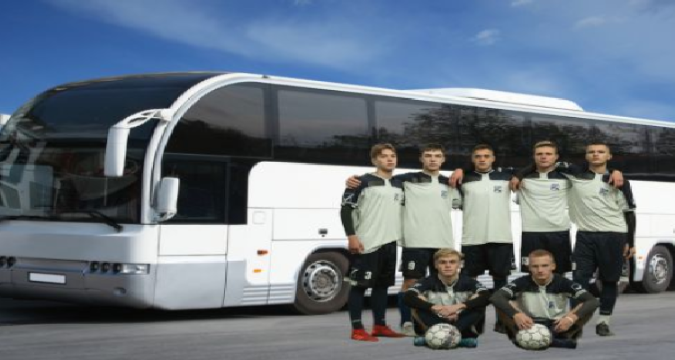
For football teams, away games bring unique challenges that extend beyond the pitch. Effective management of travel logistics can make a big difference in team performance and morale, influencing their readiness and focus on game day. Well-planned transportation ensures players and staff arrive comfortably, on time, and with minimal stress. This guide highlights essential tips to help teams manage transportation for away games effectively, covering early preparation, selecting the right transportation mode, and ensuring player comfort.
1. Start Planning Early for Efficient Logistics
Planning early is the foundation of a successful transportation strategy for away games. Once the game schedule is set, teams should begin by evaluating travel requirements based on distance, travel time, and player needs. Early planning allows teams to secure the best transportation options, lock in lower rates, and avoid last-minute issues that could disrupt the travel plan.
For teams traveling by bus, it’s essential to book with reputable providers and ensure they can meet specific requirements, such as adequate seating and onboard amenities. If flights or trains are necessary, securing tickets early ensures the team can travel together and access direct routes, which minimize travel fatigue. Additionally, early preparation gives team managers ample time to coordinate with the host venue and local transportation providers, which helps streamline logistics upon arrival.
2. Choosing the Right Mode of Transport
Choosing the best transportation mode is vital to ensure smooth travel and meet the unique needs of the team. For nearby matches, a team bus is often the most practical option. Buses allow for flexible departure times, team bonding, and a comfortable, private environment. When selecting a bus provider, look for services with comfortable seating, air conditioning, and, if possible, onboard Wi-Fi for added convenience.
For longer distances, flying may be the best choice. Direct flights are ideal, as they reduce travel time and eliminate the need for players to manage multiple layovers or connections. If flights with layovers are unavoidable, consider options with short and well-timed layovers to minimize downtime. Train travel can be a great middle ground, offering more space and a smoother ride, especially for medium distances. Whatever the mode of transport, the focus should be on providing a seamless, comfortable, and efficient journey to keep players in top condition for the game.
3. Coordination with the Destination Venue
Effective communication with the destination venue is essential to ensure smooth arrival logistics. Upon finalizing travel plans, inform the venue of the team’s arrival details, vehicle type, and any specific needs, such as secure parking or early access to locker rooms. This level of coordination helps prevent unexpected delays, allowing players to arrive and prepare without unnecessary stress.
In addition, teams should work with local transportation providers if additional transfers are required at the destination. For instance, if the team is flying, arranging pre-booked shuttles or buses to take players from the airport to the hotel or stadium can make the arrival process much smoother. Ideally, teams should appoint a dedicated logistics coordinator to oversee communications with local contacts, ensuring the team’s needs are prioritized and promptly addressed.
4. Building a Flexible Travel Schedule with Contingency Plans
Flexibility is a crucial aspect of effective travel logistics for football teams. By including buffer time in the schedule, teams can handle unexpected delays such as traffic jams, weather disruptions, or last-minute changes to the itinerary. A flexible schedule with built-in contingency time helps avoid the stress of running late and ensures the team can maintain a relaxed pace even if adjustments are necessary.
In addition to building a flexible itinerary, teams should create backup plans for alternative routes or transportation modes if disruptions occur. For example, identifying alternative routes for bus travel can be helpful in case of road closures or traffic issues. When flying, having standby tickets or connections prepared can make a big difference if flights are delayed or canceled. Flexibility in logistics helps the team stay focused on the game, knowing they have prepared for any obstacles.
5. Prioritizing Player Comfort and Well-being
Player comfort is essential, as travel fatigue can impact performance. Providing comfortable travel options, adequate legroom, and climate control can improve player comfort significantly. For longer journeys, reclining seats, Wi-Fi, and entertainment options can make the trip more enjoyable and help players relax or review strategies during the journey.
Teams should also plan for hydration, snacks, and meals during travel to keep players nourished and energized. For flights or long train rides, business-class or premium seating can be ideal to give players more room to rest. For bus travel, scheduled stops can allow players to stretch and refresh themselves, reducing stiffness and promoting physical readiness. Keeping player comfort a priority can help them arrive feeling relaxed and ready to compete.
6. Efficient Return Logistics After the Game
The journey home after an away game is just as important as the trip to the game. Proper planning ensures the team can quickly transition from the match to their return journey, allowing players to start recovery immediately. Arranging transportation that’s readily available post-game prevents delays and helps the team reach home or their hotel promptly.
For longer return trips, consider options that prioritize rest. For instance, overnight accommodations along the route or sleeping arrangements on the bus may be necessary if travel continues into the night. If the team has a game shortly after their return, efficient transportation and comfortable travel accommodations can contribute to faster recovery and preparation.
Conclusion
Managing away game logistics for football teams involves a strategic approach to transportation that balances flexibility, efficiency, and player comfort. By planning early, selecting the best transportation mode, coordinating with local venues, and prioritizing player well-being, teams can achieve a seamless travel experience. Effective travel management is essential to supporting players, ensuring they arrive focused, rested, and ready to give their best performance on the field.